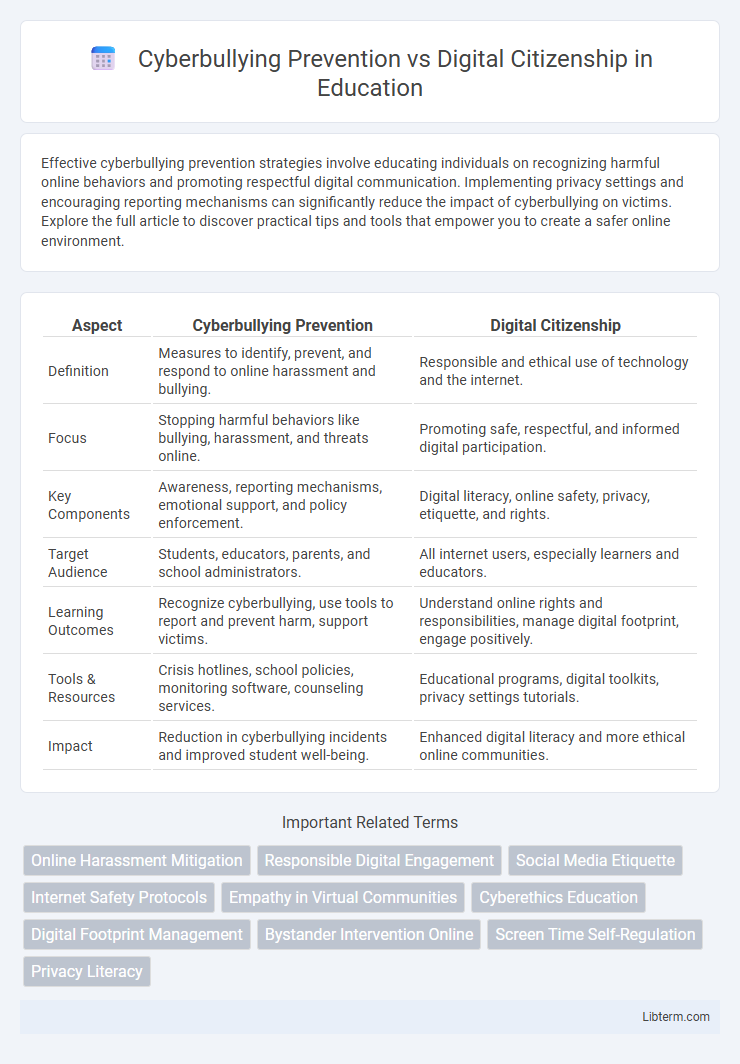Effective cyberbullying prevention strategies involve educating individuals on recognizing harmful online behaviors and promoting respectful digital communication. Implementing privacy settings and encouraging reporting mechanisms can significantly reduce the impact of cyberbullying on victims. Explore the full article to discover practical tips and tools that empower you to create a safer online environment.
Table of Comparison
| Aspect | Cyberbullying Prevention | Digital Citizenship |
|---|---|---|
| Definition | Measures to identify, prevent, and respond to online harassment and bullying. | Responsible and ethical use of technology and the internet. |
| Focus | Stopping harmful behaviors like bullying, harassment, and threats online. | Promoting safe, respectful, and informed digital participation. |
| Key Components | Awareness, reporting mechanisms, emotional support, and policy enforcement. | Digital literacy, online safety, privacy, etiquette, and rights. |
| Target Audience | Students, educators, parents, and school administrators. | All internet users, especially learners and educators. |
| Learning Outcomes | Recognize cyberbullying, use tools to report and prevent harm, support victims. | Understand online rights and responsibilities, manage digital footprint, engage positively. |
| Tools & Resources | Crisis hotlines, school policies, monitoring software, counseling services. | Educational programs, digital toolkits, privacy settings tutorials. |
| Impact | Reduction in cyberbullying incidents and improved student well-being. | Enhanced digital literacy and more ethical online communities. |
Understanding Cyberbullying: Definitions and Impacts
Cyberbullying is the use of digital platforms to harass, threaten, or humiliate individuals, causing emotional and psychological distress. Understanding its impacts includes recognizing the long-term effects on mental health, such as anxiety, depression, and lowered self-esteem among victims. Digital citizenship education promotes awareness of respectful online behavior and empowers users to identify and prevent cyberbullying effectively.
What Is Digital Citizenship? Key Principles
Digital citizenship encompasses responsible and ethical behavior when using technology, emphasizing online safety, privacy, and respectful communication. Key principles include digital literacy, critical thinking, and active participation in digital communities to foster respectful and safe interactions. Understanding these principles helps prevent cyberbullying by promoting empathy, accountability, and positive digital engagement.
Cyberbullying Prevention Strategies for Today’s Youth
Cyberbullying prevention strategies for today's youth emphasize education on respectful online communication and the importance of empathy in digital interactions. Implementing school-based programs that teach critical thinking and identify harmful behaviors effectively reduces incidents of online harassment. Encouraging open dialogue between students, parents, and educators fosters a supportive environment that promotes safe and responsible social media use.
The Relationship Between Digital Citizenship and Online Safety
Digital citizenship promotes responsible online behavior, which directly supports effective cyberbullying prevention by encouraging respect and empathy in digital interactions. Understanding digital safety principles empowers users to recognize and respond to cyberbullying incidents, fostering safer online environments. Integrating digital citizenship education enhances users' ability to navigate internet risks and protect themselves and others from online abuse.
Building Empathy and Respect in Virtual Spaces
Building empathy and respect in virtual spaces is essential for effective cyberbullying prevention and fostering digital citizenship. Encouraging users to understand diverse perspectives and practice kindness online reduces harmful interactions and promotes a positive, inclusive digital environment. Integrating empathy training into digital citizenship programs enhances social responsibility and supports safer online communities.
Role of Schools in Cyberbullying Prevention and Digital Citizenship
Schools play a crucial role in cyberbullying prevention by implementing comprehensive policies, promoting awareness programs, and fostering a safe online environment for students. Integrating digital citizenship education equips students with critical skills to navigate the internet responsibly, understand ethical behavior, and recognize the consequences of cyberbullying. Collaborative efforts between educators, parents, and students enhance the effectiveness of these initiatives, creating a culture of respect and empathy in digital spaces.
Parental Guidance: Fostering Responsible Online Behavior
Parental guidance plays a crucial role in cyberbullying prevention by teaching children responsible online behavior and setting clear boundaries for digital interactions. Encouraging open communication about internet use helps parents identify early signs of cyberbullying and supports the development of empathy and respect in digital citizenship. Providing resources on privacy settings, respectful communication, and critical thinking reinforces a safe and positive online environment monitored by proactive caregivers.
Technology’s Role: Tools and Resources for Prevention
Technology plays a critical role in cyberbullying prevention through tools like AI-driven content monitoring, real-time threat detection software, and user-reporting platforms that identify and mitigate harmful behavior online. Digital citizenship education incorporates these technological resources to empower individuals with knowledge about safe online practices, privacy settings, and ethical communication. Leveraging advanced algorithms and educational apps fosters responsible digital interactions, reducing the prevalence of cyberbullying across social media and virtual learning environments.
Legal and Ethical Considerations in the Digital Age
Cyberbullying prevention and digital citizenship both emphasize legal and ethical responsibilities, highlighting laws such as the Children's Online Privacy Protection Act (COPPA) and the Digital Millennium Copyright Act (DMCA) that protect users from online harassment and intellectual property violations. Ethical considerations encourage respectful communication, digital empathy, and accountability, fostering a safe online environment aligned with societal norms and legal standards. Understanding these frameworks equips individuals, educators, and policymakers to navigate the complexities of online interactions while promoting responsible and lawful digital behavior.
Creating a Culture of Positive Digital Engagement
Cultivating a culture of positive digital engagement involves embedding cyberbullying prevention practices within the broader framework of digital citizenship education. Emphasizing respect, empathy, and responsible online behavior empowers individuals to recognize and counteract cyberbullying effectively while promoting safe and inclusive virtual communities. Schools and organizations adopting digital citizenship programs enhance awareness and foster proactive strategies that reinforce respectful interaction and digital well-being.
Cyberbullying Prevention Infographic

 libterm.com
libterm.com